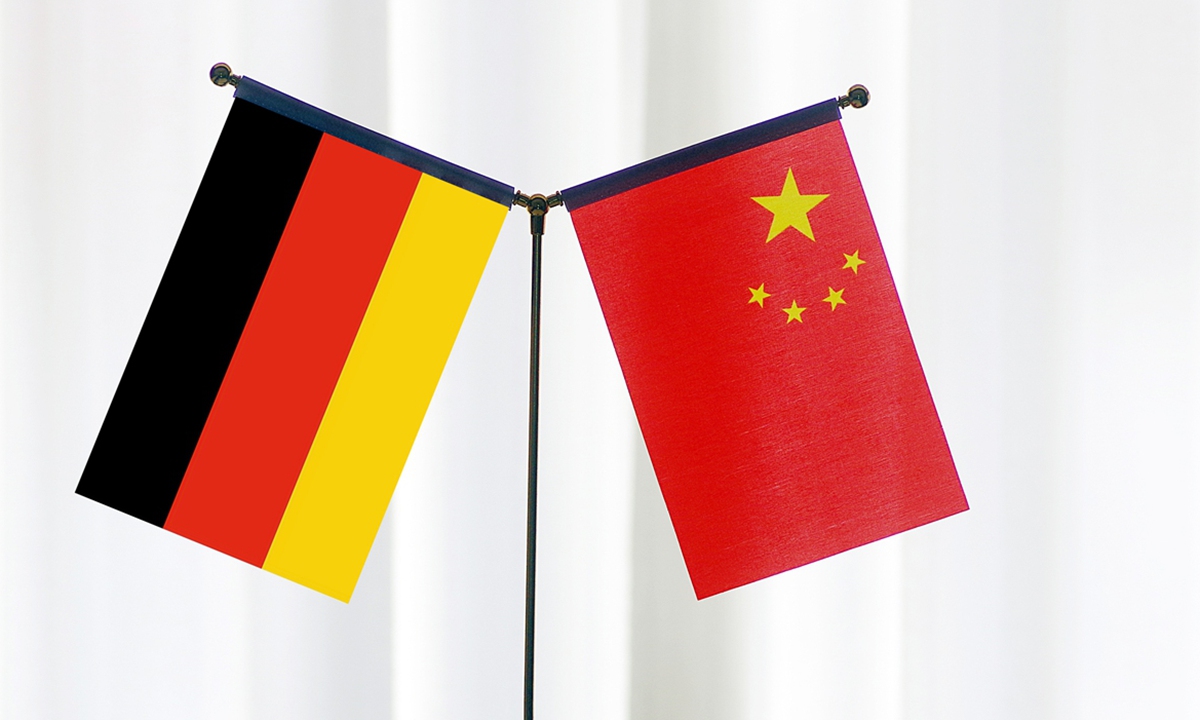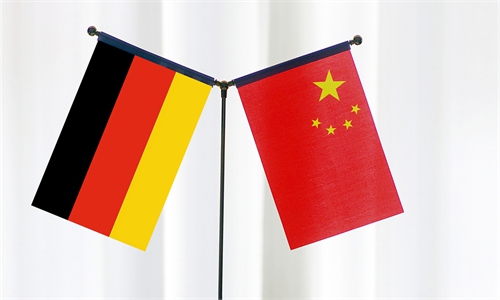Investment roundtable for German companies held ahead of high-level visit; businesses embrace China’s market potential, oppose 'decoupling'
German companies embrace China's booming market potential, oppose 'decoupling'

China Germany Photo: CFP
German companies expressed their positive stance on the Chinese economy as well as their expectations to further tap into the potential of the China market, and highlighted their stance of opposing protectionism at the "Invest in China - Roundtable-Meeting" held in Munich, Germany on Saturday, ahead of the reported upcoming visit of Germany's top leader to China in April.
The remarks reflected their continuous commitment to the China market despite lingering calls for "decoupling" or "de-risking" by some European politicians and media outlets, Chinese experts said.
While the US and some other Western countries are constantly clamoring for the "de-risking" targeting China, facts have proved that the China market cannot be replaced, Wang Yiwei, a professor at the School of International Relations at Renmin University of China, told the Global Times on Sunday.
The roundtable meeting, held by China's Ministry of Commerce (MOFCOM), provided the opportunity for German businesses to interact with Chinese government officials and reiterate their positive stance on the China market and economy, which have become increasingly important for German businesses to maintain their global growth.
Investing in China has become a "common necessity for development" for both Chinese and German companies, and the event also helps German firms to enhance their global competitiveness, Vice Minister of Commerce Ling Ji said when hosting the "Invest in China - Roundtable-Meeting " on Saturday.
The Chinese side attaches great importance to economic and trade cooperation with Germany, Ling said.
For nearly half a century, Germany has consistently been China's largest trading partner in Europe. Bilateral trade accounts for one-third of the total trade between China and Europe. Investment by German companies in China constitutes one-third of the EU's total investment in China.
These facts show that the economic and trade relationship between the two countries has created a favorable situation of mutual benefit and interdependence, according to Ling.
Representatives of German companies and business groups including the Chamber of Commerce and Industry for Munich and Upper Bavaria as well as executives from six large enterprises including BMW, Siemens and Infineon, and two "hidden champion" companies attended the meeting and delivered speeches, according to the MOFCOM on Sunday.
Speaking at the roundtable on Saturday, German business leaders expressed their view that China is one of the most important markets in the world and is a true world factory that plays a crucial role in global industrial and supply chains.
In the long run, German enterprises will continue to thrive in economic globalization, provided they adhere to free trade principles, representatives of the German companies said. They also highlighted their stance of welcoming competition from emerging markets, opposing protectionism, and advocating against "decoupling" or even severing economic and trade ties with China.
The roundtable came amid the reported upcoming visit in April of German Chancellor Olaf Scholz to China with a business delegation. Germany's top corporate brass will join Scholz when he visits China later this month, according to a Reuters report.
Chinese experts said that the reported visit of such a business delegation serves as another indication of the "failure of the Western attempt at 'decoupling' or 'de-risking' with China," their major trading partner, as businesses embrace the Chinese market.
"The large high-level delegation of the German government and businesses shows that the country's remaining commitment and emphasis on the Chinese market and strengthening economic and trade ties with China is a common expectation for business groups," Yang Chengyu, an associate research fellow at the Institute of European Studies of the Chinese Academy of Social Sciences, also told the Global Times on Sunday.
Some leading German companies confirmed to the Global Times on Sunday the participation of their CEOs to China in the German delegation.
For example, Ola Källenius, chairman of the board of Mercedes-Benz AG, will visit China together with Scholz, the Global Times learned from the company on Sunday. The company's investment in China has been increasing in recent years, particularly in the booming electrification sector.
BMW boss Oliver Zipse and Bayer CEO Bill Anderson will also travel with Scholz, people familiar with the matter said, according to Reuters.
Although some European politicians and media outlets have been advocating "decoupling" from China and repeatedly smearing the Chinese economy, facts have proved that "decoupling" from China is not feasible and their commitment to the China market remains unchanged, according to Yang.
German companies still attach great importance to the development of the Chinese market economy and look forward to further deepening bilateral economic and trade relations, and closer bilateral ties will also play an important role in promoting Germany's economic recovery in the post-COVID era, Yang said.
In 2023, Germany's GDP shrank by 0.3 percent due to persistent inflation, high energy prices and weak foreign demand, according to the Federal Statistics Office. Experts said that German companies are ramping up investment in China to gain new impetus for growth.

